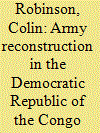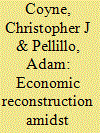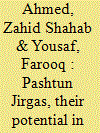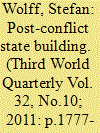|
|
|
Sort Order |
|
|
|
Items / Page
|
|
|
|
|
|
|
| Srl | Item |
| 1 |
ID:
113212


|
|
|
|
|
| Publication |
2012.
|
| Summary/Abstract |
Since the peace agreements of 2002-2003 which ended the second war in the Democratic Republic of Congo, reconstruction of the army has been an inherently political process, in common with other attempts to carry out security sector reform (SSR). This article briefly sketches out the Congolese army's history, then attempts to fill a gap in the literature on Congolese SSR by detailing what can be found of the actual structure and shape of the present army. The efforts that have been made to reform the army are then examined, followed by a conclusion which examines the major issues and possible ways forward.
|
|
|
|
|
|
|
|
|
|
|
|
|
|
|
|
| 2 |
ID:
117594


|
|
|
|
|
| Publication |
2012.
|
| Summary/Abstract |
Post-conflict states represent an important research agenda for scholars studying foreign direct investment (FDI). While leaders of post-conflict states have strong incentives for trying to attract international investments, multinational corporations (MNCs) may view these states as high-risk since the reoccurrence of violence in the aftermath of civil conflict is common. Consequently, leaders of post-conflict states desperate to receive FDI to help ignite their stalled economies must convince MNCs that their state is a stable and secure place to invest in. Drawing on the recent literature that identifies the importance of domestic and international institutions for securing FDI, this article argues that post-conflict justice (PCJ) institutions can help post-conflict states attract investment. The domestic and reputation costs associated with implementing PCJ allow states to send a costly and credible signal to international investors about the state's willingness to pursue the successful reconstruction of the post-conflict zone. Under these conditions, uncertainty is lessened and foreign investors can feel more confident about making investments. Post-conflict states, therefore, that choose to implement PCJ are more likely to receive higher levels of FDI compared with post-conflict states that refrain from implementing these institutions. Statistical tests confirm the relationship between justice institutions and FDI from 1970-2001. Post-conflict states that implement restorative justice processes in the post-conflict period receive higher levels of FDI than those countries that do not implement a process.
|
|
|
|
|
|
|
|
|
|
|
|
|
|
|
|
| 3 |
ID:
110009


|
|
|
|
|
| Publication |
2011.
|
| Summary/Abstract |
Economic reconstruction typically takes place after the end of war. Yet recently, economic reconstruction has been viewed as a means to 'win hearts and minds' during ongoing conflict. Drawing on a variety of reconstruction experiences from Afghanistan and Iraq, we identify four 'reconstruction traps' that result from the incentives and constraints faced by actors involved in economic reconstruction during ongoing conflict. These traps include: 1. the credible commitment trap, 2. the knowledge trap, 3. the political economy trap, and 4. the bureaucracy trap. Avoiding these traps is critical for successful economic reconstruction; and we discuss potential strategies for doing so.
|
|
|
|
|
|
|
|
|
|
|
|
|
|
|
|
| 4 |
ID:
157486


|
|
|
|
|
| Summary/Abstract |
Relations between Pakistan and Afghanistan have mostly been hostile since 1947. The animosity has grown in complexity from various territorial disputes to frequent allegations of cross-border terrorism in the post-9/11 era. This article first makes a case for involving Jirgas, a traditional dispute resolution mechanism among Pashtuns, for improving peace dialogues between both countries. It presents evidence of the traditional acceptability of Jirgas by Pashtuns on both sides of the border and assesses previous official bilateral attempts of using Jirgas. It then proceeds to propose some new policy recommendations focused on national reconstruction of Afghanistan, which include involvement of the Taliban as an important local stakeholder. The dual key argument then becomes, first, that since Jirgas have long-standing local legitimacy and acceptability both in Afghanistan and Pakistan, using the strength of their social recognition would allow higher-level bilateral negotiations between the neighbours, enhancing the effectiveness of new and locally more credible forms of multi-track diplomacy. Second, reinvigorating the Jirga system would allow the Afghan people themselves to engage in fuller multi-dimensional debates on sustainable modalities for their own future, on terms to be set by them, not outsiders.
|
|
|
|
|
|
|
|
|
|
|
|
|
|
|
|
| 5 |
ID:
108111


|
|
|
|
|
| Publication |
2011.
|
| Summary/Abstract |
A significant theoretical and empirical question underlying much of the literature on post-conflict state building is which institutions offer the best prospect for peace and democracy in divided societies recovering from conflict. This debate is highly relevant for many developing countries. With much invested by third parties in post-conflict reconstruction and a mixed track record of success at best, the question explored by this article is whether consociational institutional designs-widely applied in policy practice and severely criticised in academic discourse-can accomplish the twin goals of peace and democracy in divided post-conflict societies. Examining the claims of supporters and detractors of consociationalism, the article finds substantial conceptual and empirical evidence that consociational institutions hold significant promise for building democratic states after conflict in divided societies.
|
|
|
|
|
|
|
|
|
|
|
|
|
|
|
|
| 6 |
ID:
121846


|
|
|
|
|
| Publication |
2013.
|
| Summary/Abstract |
Considerable resources are devoted to ex-combatant reintegration programs in current peace processes, but evidence on their effectiveness remains thin. We use original survey data to study an ex-combatant reintegration program implemented after Burundi's 1993-2004 civil war. Previous quantitative studies have found reintegration programs to be ineffective, but only ex-combatants who self-selected into programs were studied. We avoid such selection problems with a quasi-experimental design exploiting an exogenous bureaucratic failure. We find the program resulted in a 20 to 35 percentage point reduction in poverty incidence among ex-combatants and moderate improvement in livelihoods. But this economic boost does not seem to have caused political reintegration: while we find a modest increase in propensities to report civilian life as preferable to combatant life, we find no evidence that the program contributed to either more satisfaction with the peace process or a more positive disposition toward current government institutions.
|
|
|
|
|
|
|
|
|
|
|
|
|
|
|
|
|
|
|
|
|